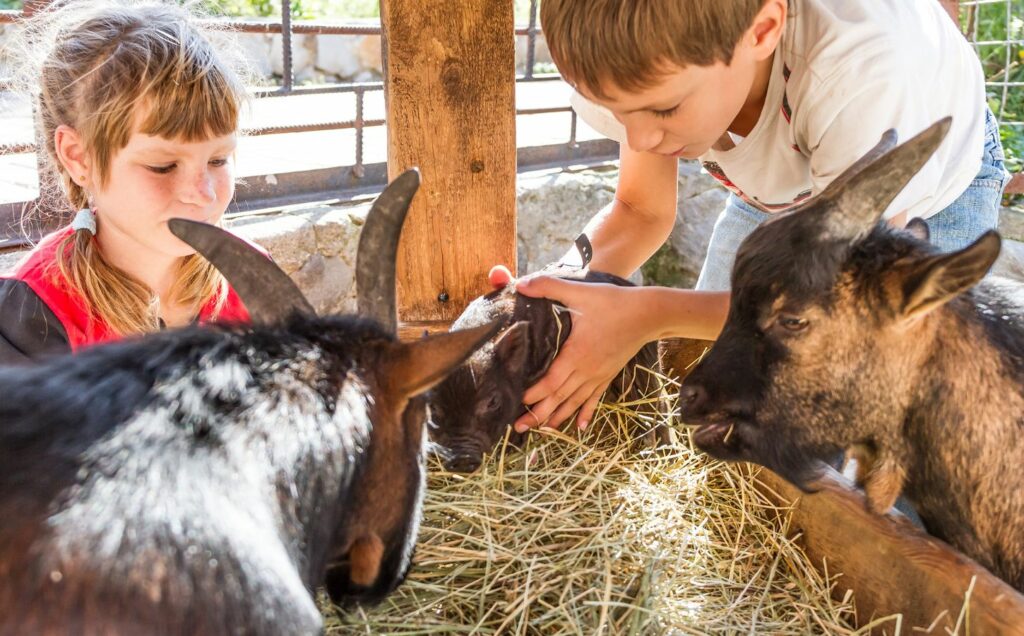Schools across the UK have come under scrutiny for keeping farmed animals as a learning activity for children.
Animal rights organization Viva! has launched a new petition calling for the government to introduce a ban on the practice. It was inspired to do so after hearing that a pig named Boris, who was being kept at a Somerset school, was due to be sent to slaughter.
Boris was rescued after one of the parents raised concerns about his fate, and he’s due to be rehomed at a sanctuary very soon.
But not all of these animals have happy endings. There are currently more than 120 schools in the UK registered as having farms, and there may be even more that haven’t signed up to the official database.
According to Viva!, animals – like pigs, sheep, and chickens – are kept to teach children “where meat comes from.” The organization has highlighted that the majority of these animals will inevitably end up in the slaughterhouse after being cared for and loved by the children.
The cruelty of school farms
Children have natural compassion towards animals and Viva! founder and international director Juliet Gellatley has criticized the fact that they are encouraged to bond with an animal destined for slaughter.
“All it does is teach children to love and care for an animal and see them as true beings, and then to snatch away all that emotion and love for a total falsehood,” she says. “Because the school is trying to say that this is what the reality of the world is. But the reality of the world is that the vast majority of animals are factory farmed.”
Around 85 percent of UK land animals are factory farmed. But despite the fact that most animals are raised in cages and sheds without any access to the outdoors, meat marketing often depicts happy animals in green fields. Gellatley argues that schools are perpetuating this false narrative of UK farming by keeping these animals.
“They’re not telling children the truth,” Gellatley says. “They’re painting some false idyll. Which totally plays into the farming community’s hands.”
The horrors of animal farming
Animals kept on factory farms are subjected to serious infringements on their welfare.
Pigs are kept in crates too small for them to turn around in, and chickens are afforded an area no bigger than an A4 sheet of paper in cramped barns. Farmed animals are also subject to painful mutilations, such as having their tails removed.
Animal farming is also terrible for the environment. It’s a leading cause of deforestation, biodiversity loss, and resource depletion, and is also responsible for at least 14.5 percent of global greenhouse gas emissions.
Meat consumption has also been linked to disease. For example, processed meat is classed as a group one carcinogen by the World Health Organization (the same category as tobacco smoking and asbestos).
For these reasons, Gellatley believes that schools should instead be promoting the consumption of fruits, vegetables, pulses, and other plant-based foods.
“The logic is absolutely profound,” she says. “You’re talking about kids having major environmental catastrophes happening when they’re in their twenties now. It’s not long. And schools, I think, have a responsibility to protect children’s future, and to educate them honestly. And they’re not being honest.”
The future of school farms
While the government is being pressured to crack down on keeping animals on farms, it doesn’t necessarily mean that these types of projects should stop completely.
Viva! has highlighted the fact that a number of schools have plant-based farms, and teach their students how to grow their own fruits, herbs, and vegetables. This, Gellatley thinks, should be encouraged.
“The kids can get their hands dirty, they’re out there in the soil, they can see where their food is actually coming from, and we applaud that.”
You can sign Viva!’s petition here.






